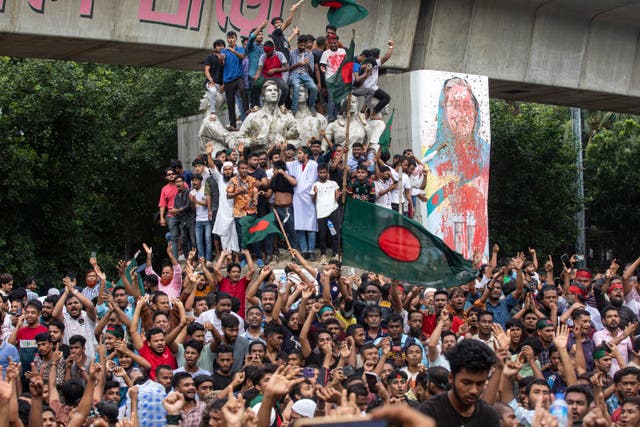Bangladesh’s president dissolves parliament amid violent protests
The streets of Dhaka appeared calmer, with no reports of new violence as jubilant protesters thronged ousted leader Sheikh Hasina’s residence.

Bangaldesh’s president has dissolved the country’s parliament, clearing the way for new elections to replace the long-time prime minister who resigned and fled the country following weeks of demonstrations against her rule that descended into violent unrest.
The streets of Dhaka appeared calmer on Tuesday, with no reports of new violence as jubilant protesters thronged the ousted leader’s residence.
As the country waited for a new government to emerge, a key student leader said protesters wanted Nobel Peace Prize laureate Muhammad Yunus to head an interim government.
Mr Yunus, who is currently in Paris for the Olympics, called Sheikh Hasina’s resignation the country’s “second liberation day”.
He could not immediately be reached for comment, but student leader Nahid Islam said Mr Yunus had agreed.

Prime Minister Sheikh Hasina’s 15 years in power ended with the leader and her sister boarding a helicopter for India, as thousands of protesters defied military curfew orders to march on her residence, which they later sacked along with buildings associated with her party and family.
Her departure came after protests against a quota system for government jobs grew into broader challenge to her 15-year rule as scores were killed in clashes between protesters, security forces and pro-government activists.

The military wields significant political influence in Bangladesh, which has faced more than 20 coups or coup attempts since independence in 1971.
Earlier on Tuesday, protest leader Sarjis Alam told reporters that they had asked the president to dissolve Parliament by 3pm, and threatened to renew demonstrations otherwise as they seek to “repair the state”.
“We have proposed the name of Muhammad Yunus with his consent, now if someone else comes from among the MPs, we will not allow that to happen,” he said.
A long-time opponent of the ousted leader, Mr Yunus was accused of corruption by her government and tried on charges he said were motivated by vengeance.
He received the Nobel in 2006 for work pioneering microlending.

Amid celebrations, student Juairia Karim said it was a historic day.
“Today we are getting what we deserve,” she said. “Everyone is happy, everyone is cheerful.”
But the country was still counting the toll of weeks of violent unrest that produced some of the country’s worst bloodshed since the 1971 war of independence.
Many fear that Ms Hasina’s departure could lead to even more instability in the densely populated South Asian nation, which is already dealing with crises from high unemployment to corruption to climate change.
Violence just before and after Ms Hasina’s resignation left at least 109 people dead, including 14 police officers, and hundreds of others injured, according to media reports, which could not be independently confirmed.

In the southwestern district of Satkhira, 596 prisoners and detainees escaped from a jail after an attack on the facility Monday evening, the United News of Bangladesh agency reported, as police stations and security officials were attacked across the country.
Police in Dhaka mostly left their stations and assembled in a central barracks in fear of attacks after several stations were torched or vandalised.
Ms Hasina landed at a military airfield near New Delhi on Monday after leaving Dhaka and met India’s national security adviser Ajit Doval, the Indian Express newspaper reported.
The report said Ms Hasina was taken to a safe house and is likely to travel to the UK.
The 76-year-old was elected for a fourth consecutive term in a January vote that was boycotted by her main opponents.
Thousands of opposition members were jailed before the polls, and the US and the UK denounced the result as not credible, though the government defended it.





